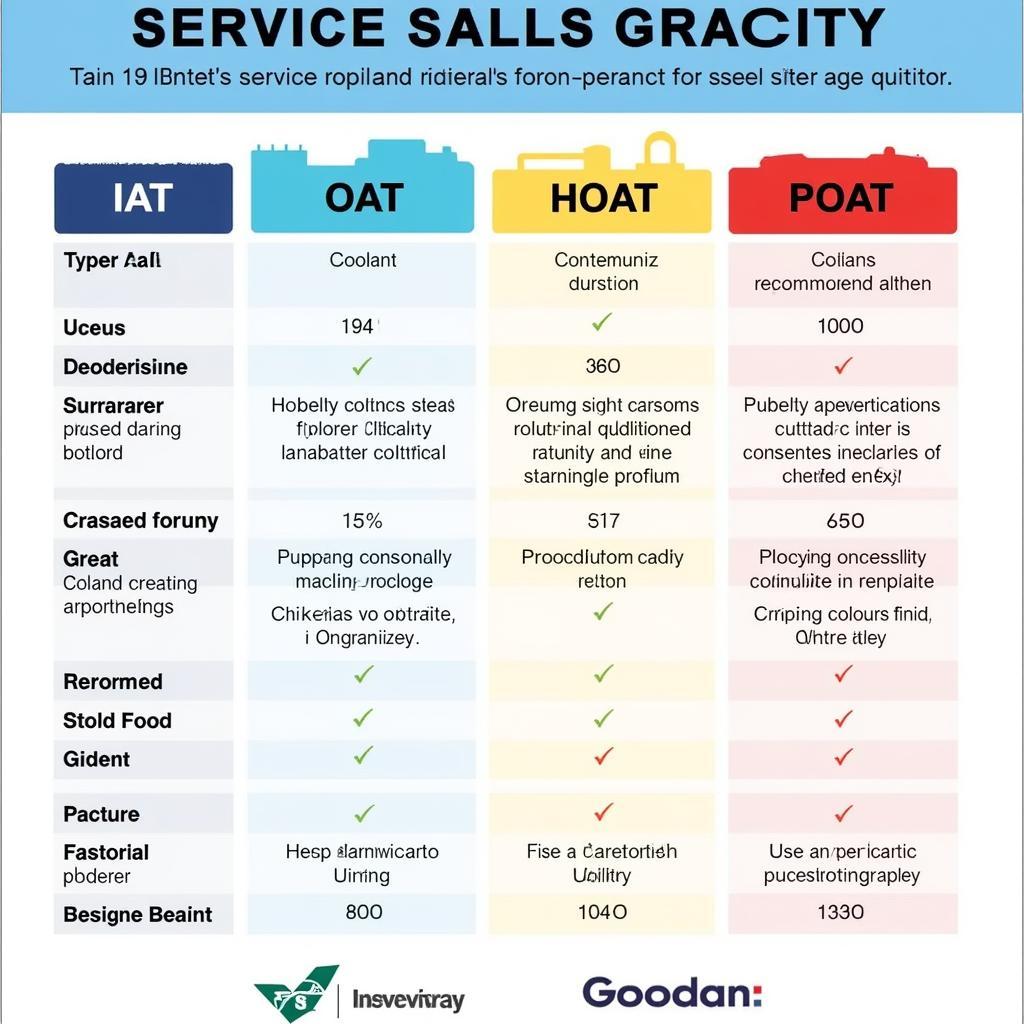Can you mix same color coolants? It seems like a simple question, but the answer is more nuanced than a simple yes or no. While mixing coolants of the same color might seem harmless, it’s crucial to understand the chemistry involved to ensure the longevity and efficiency of your vehicle’s cooling system. Let’s delve into the complexities of coolant compatibility.
Understanding Coolant Chemistry: Why Color Isn’t Everything
Coolant, also known as antifreeze, is more than just colored water. It’s a complex mixture of chemicals designed to regulate your engine’s temperature, prevent freezing in cold weather, and protect against corrosion. While color can provide a hint about the coolant type, it’s not a reliable indicator of compatibility. What color is coolant fluid? Manufacturers use different dye colors, and even coolants of the same color can have vastly different chemical compositions. Mixing incompatible coolants, even if they share the same hue, can lead to a sludge-like buildup that can clog your cooling system and cause overheating.
Decoding Coolant Types: IAT, OAT, HOAT, and POAT
To understand coolant compatibility, it’s essential to know the different types: Inorganic Additive Technology (IAT), Organic Acid Technology (OAT), Hybrid Organic Acid Technology (HOAT), and Phosphate Organic Acid Technology (POAT). Each type uses a different blend of chemicals and inhibitors to protect your engine. IAT coolants are typically green or blue, while OAT coolants come in various colors, including orange, red, and pink. HOAT and POAT coolants can also vary in color. For specific information on Mopar coolant color, check out our article on what color is mopar coolant.
 Different Coolant Types Chart
Different Coolant Types Chart
Can I mix the same type of coolant but different brands?
Even within the same coolant type (e.g., two different brands of OAT coolant), mixing isn’t always recommended. While they might share the same base chemistry, the specific additives and inhibitor packages can differ. These variations, although seemingly minor, can sometimes interact negatively and reduce the effectiveness of the coolant. Check your vehicle’s owner’s manual or consult with a qualified mechanic for the correct coolant type and brand.
What Happens if I Mix the Wrong Coolants?
Mixing incompatible coolants can have detrimental effects on your cooling system. The chemical reactions between the different additives can form a gel-like substance that obstructs coolant flow, leading to overheating, reduced engine performance, and even costly repairs. Can you mix different colored antifreeze? This article dives deeper into the risks of mixing antifreeze. If you suspect you’ve mixed the wrong coolants, it’s essential to flush your cooling system and refill it with the correct type.
What if I have a coolant leak?
What color is coolant leak? Identifying a coolant leak early is crucial. It may not always be the obvious bright color of your coolant. Check this article for more information on identifying leaks.
Expert Insight: The Importance of Proper Coolant Maintenance
“Choosing the correct coolant isn’t about aesthetics, it’s about chemistry,” says automotive expert, Dr. Emily Carter, a leading researcher in automotive fluids. “Matching the correct coolant to your vehicle’s specifications is crucial for optimal engine performance and preventing long-term damage.”
Another industry expert, Michael Davis, a seasoned mechanic with over 20 years of experience, adds, “Many people assume that color is the key, but that’s a dangerous misconception. Always consult your owner’s manual or a trusted mechanic for guidance. A simple mistake can lead to costly repairs down the line.” He points out that discussions on is it ok to mix coolant colors reddit can often be misleading and it’s always best to rely on professional advice.
Conclusion: Can you mix same color coolants? Proceed with Caution!
While mixing coolants of the same color might seem safe, it’s essential to prioritize compatibility over color. The chemical composition of the coolant is the determining factor, and even slight variations can lead to problems. Always consult your vehicle’s owner’s manual or a qualified mechanic to ensure you’re using the correct coolant for your car. This proactive approach will protect your engine, prevent costly repairs, and keep your vehicle running smoothly for years to come.
FAQ
-
Q: Is it safe to mix different brands of the same color coolant? A: Not necessarily. Even within the same color, different brands may have different chemical compositions.
-
Q: What should I do if I accidentally mix the wrong coolants? A: Flush your cooling system and refill it with the correct coolant type.
-
Q: How often should I change my coolant? A: Consult your owner’s manual for the recommended coolant change interval.
-
Q: What is the difference between coolant and antifreeze? A: Coolant is a mixture of antifreeze and water.
-
Q: Can I use water instead of coolant? A: No, water lacks the necessary corrosion inhibitors and freeze protection provided by coolant.
-
Q: What is the best coolant for my car? A: The best coolant for your car is the one specified in your owner’s manual.
-
Q: What are the signs of a coolant leak? A: Signs of a coolant leak can include a sweet smell, puddles under your car, overheating, and low coolant levels.
Need help with your car’s cooling system? Contact us! Phone: 0373298888, Email: [email protected] or visit us at 86 Cầu Giấy, Hà Nội. We have a 24/7 customer support team.

